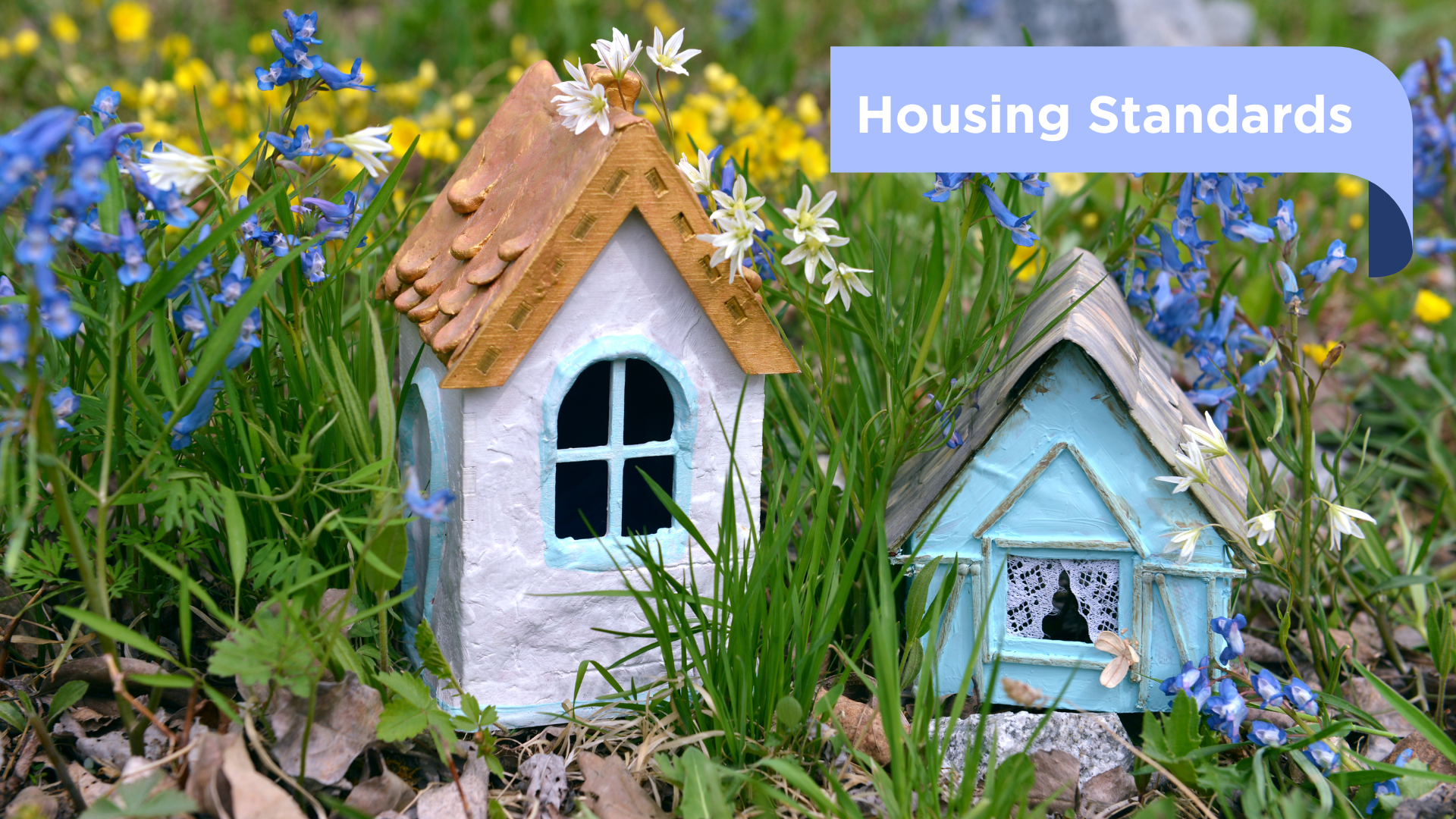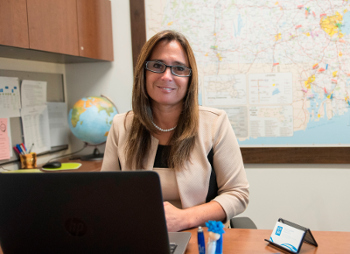Do you have a question about JRI services?

The Housing Standards Assessment is typically the first time you will meet the Homefinding Team.
This visit is a planned visit that occurs at your home once your application has been accepted.
For specifics on the eligibility requirements to apply to foster, check out our blog before this. Once you are caught up, continue on with this blog!
The Housing Standards Assessment is a time for the Homefinding Team to meet you, sit down and answer questions you may have, and be sure your home meets the Housing Standards required to be a foster home. We are not looking for a magazine-perfect house. We do want to see a hygienic, safe home that is equipped with necessities to meet a child’s needs. The criteria we assess is determined primarily by the Department of Children and Families, along with a few things JRI requires.
Read on to learn the criteria!
- Detectors on Every Floor- We check to see you have working smoke and carbon monoxide detectors on every floor. We will test them to be sure they function. There must be a smoke detector and carbon monoxide detector (*or combination detector) in the kitchen area and in the bedroom areas.
- Methods of Egress and Stairways are Free of Obstructions- Folks must be able to safely and swiftly exit and enter your home and be safe on the stairways.
- Railings on Stairways- There must be secure railings on stairways.
- Fire Extinguisher- There must be a working, in-code fire extinguisher in the kitchen and in other hot-spot areas (laundry rooms, fire pits, fire places, grills, etc.).
- Hygienic- Homes must appear hygienic and reasonably clean. There should not be animal feces or waste, excessive dirt or grime, pileups of trash, mold or mildew, or other hazardous conditions. If we observe this, we will have a conversation about what needs to be different and make a plan for change with you. We will continuously observe the conditions of your home throughout the assessment process and note if you are able to comply with and maintain these changes.
- Working Bathrooms- There must be at least one bathroom equipped with a toilet, sink, and tub/shower. There must be working plumbing, running water, hot water that does not exceed 120 degrees, and a toilet that flushes. We will flush your toilet, turn on your water, and use a thermometer to determine how hot it gets. If it is too hot, we will ask you to turn down the temperature on your water heater.
- Working Kitchen- Your home must include a kitchen with a working stove and oven, refrigerator and freezer, sink, and hot water. We check to see that food appears safely stored and that the space appears clean and hygienic.
- Hazardous Materials Secured- Your cleaning products, tobacco products, vapes, alcohol including wine and beer, medications, marijuana products, or other hazardous materials must be stored in a manner that is locked and inaccessible to children and youth. Folks can ask Homefinders about this and we can help you find solutions to ensure that a child cannot access these types of materials. If they are not correctly stored at the time of our visit, we will discuss what changes must occur and will follow up to observe compliance.
- Bedrooms- There must be appropriate bedrooms for all household members. We cannot approve homes with household members sleeping in common areas like the living room. There must be a bedroom for a child in care. It cannot be shared with another person or a multipurpose space, like a bedroom/office. It must include a door that closes fully for privacy and a window to use as a method of egress. It must be a minimum of 50 square feet. We will measure the bedroom. Foster parents must furnish the bedroom with a bed, bureau and closet or wardrobe for hanging clothing, and space to store personal items (desk, side table, etc.). It is not necessary to furnish the bedroom at the time of this visit, but it must be furnished before the home can be approved.
- First Aid Kit- Homes must have a first aid kit that is not expired. They must have disposable gloves (we recommend non-latex gloves). We suggest one that includes a variety of sizes of bandages, tweezers, antiseptic swabs, a thermometer, scissors, eye wash, a CPR mask, gauze, an emergency blanket, and an emergency cold pack.
- Adequate Space- Your home should have adequate space for all proposed family members, meaning that by adding another person to your home, you will have space for them to sit in the living room, space to eat, and space to play or enjoy recreational time.
- Adequate Lighting, Ventilation and Temperature Control- Homes should have good ventilation, so that air circulates comfortably. There should be appropriate temperature control so that it is warm enough during cool weather and cool enough during warm weather. This can be achieved with furnaces, mini-splits, fans, air conditioning, etc. Windows should be able to open and have screens to allow for air circulation. Windows should have child safety locks or applicants should be willing to install them so children cannot fall out/push out of a window. Homes should also have adequate lighting, so that one can see on stairways, in each room, in hallways, etc. This can be achieved with lamps, overhead lighting, and outdoor lighting.
- No Evidence of Infestation- Homes must be free of pestilence, including insect and rodent infestation.
- Child Proofing- You will discuss with your Homefinder the ages you plan to parent. This could change over the course of the Assessment, but all foster parents must be willing to child-proof their homes for the ages they will serve, including installing baby gates, childproof locks on cabinets and doors, and using outlet covers on all unused outlets.
- Furnace Inspection- JRI requires that all foster homes have a furnace inspection annually. This must be completed before your home can open. This ensures that your oil or gas heat furnace is functioning safely and not leaking carbon monoxide.
- Well Water Testing- For homes that use well water, they must show a water inspection annually. This must be completed before the home can be open, to ensure the water is safe.
- Chimney Sweep- Chimneys must have proof of cleaning annually. This is to ensure they are safe, well-ventilated, and do not pose risk of fire. This must be completed before your home can open.
- Basic Safety- We want to be sure spaces like garages, sheds, barns, or other spaces will be restricted to children or be arranged in a safe manner. This is very specific and will be individually assessed.
- Third Floor and Up- For bedrooms located on the third floor or above, we must see that there are two appropriate methods of egress. That could be a front and back stairway, a main stairway and a fire escape, or other appropriate method of egress from which a child could escape in the event of a fire.
- Water- Pools, Jacuzzis, and large bodies of water will be inspected and assessed for safety compliance.
- Weapons- Weapons, including guns, bows and arrows, spears, swords, knives, or other weapons will be viewed. Homefinders will ensure they are stored appropriately and are inaccessible to children.
Housing Standards are subject to change as the Department of Children and Families, our insurance company, or other licensing entities may dictate changes. Additionally, some homes may have unique features that are not represented in these criteria. They will be handled on an individual basis and a safety plan will be created that is in the best interest of children in foster care.
After the Housing Standards Assessment, your Homefinders will share with you any changes that must be made and ask you how you plan to address those issues.
After the Housing Standards Assessment
As long as it appears that changes are possible or safety standards are achieved, your Homefinder will then begin the Caregiver Assessment process with you. What is the Caregiver Assessment? Stay tuned for our next blog!



